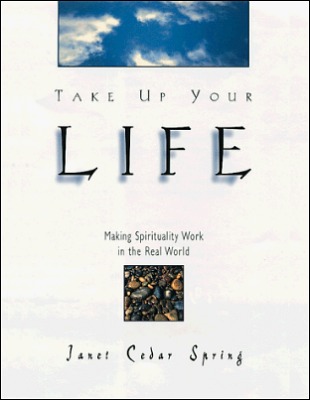"In Japan, up until World War II, there was a temple that included an ancient tree, venerated for generations. People held marriages under this tree, brought their children there for their first blessing, held funerals there. Daily offerings were made to the tree, and services and chanting were frequent. It was a beloved part of the community and was regarded as a source of blessing for all.
"This temple was near the center of Hiroshima. The tree was killed when an atomic bomb was dropped on the city on August 6, 1945.
"The people were dismayed, lost. They did not know what to do. How would their lives go on without the support of the beloved spirit that was their great tree?
"Not knowing what to do, they continued their daily routine. They brought offerings of food and water to the tree, just as they had done when it was alive. They continued to hold their ceremonies under it, to pray to it, and to bring their lives into its presence. For forty-five years they continued in this manner with the dead tree.
"And then, one spring, the tree brought forth flowers once again.
"To take up a lost cause is to continue when despair is the only reasonable course.
"This is where the opening occurs. This is hope.
"One cannot hope that the tree will bloom. One cannot plan. Hope is not a belief that the continued acts of devotion will bring back the lost. No; if the offerings of the people of Hiroshima had been designed to that end, they would have been acts of magic or fantasy and not the true thing.
"What, then, is hope?
"Hope is in the present. It reaches out and embraces. It persists. It continues. It will not give up, even though reason says it ought to quit.
"Hope greets life warmly. Hope focuses on life even when surrounded by death; it finds encouragement in the midst of suffering.
"What we usually mean by hope is that we expect something specific to get better. This can help us through a rough moment, by postponing disappointment. But this kind of hope is false; it is actually a commitment to illusion. When things go badly, when we are disappointed again and again, any investment we have made here will become proof against hope, reason for cynicism, cause for despair.
"There is another hope, one that actually can give us something that lasts. This hope means trusting that there's some kind of pattern, that difficulties have meaning, that our lives make sense.
"This hope trusts that 'all things work together for good for those that love God,' even when it cannot understand the details of this present moment. Embraced by all beings, resting in the care of a benevolent God or a friendly universe, it knows that whatever happens is part of a process that works. This hope lets the larger forces do their job while we do ours.
"The deepest level of hope comes when we let go of needing life to make sense. Here we find the possibility of replacing 'Why me?' with 'Why not me?' Embraced in the largeness of all life, we become willing to put up with difficulty, with pain and suffering, with uncertainty and confusion.
"In this most spacious hope, expectations are simply irrelevant. We meet each day with warmth and enthusiasm. We embrace life as it is. We laugh compassionately at our own mistakes. Here, finally, we are able to say with Job, 'The Lord giveth and the Lord taketh away; blessed be the name of the Lord.' "
"There's a story of a rabbi in the Nazi concentration camps. He was very hungry, as was everyone. He found a potato. Another man found him and tried to take it from him. They struggled. Suddenly he thought, 'What am I doing, fighting with this man for a potato?' He remembered who he was; in that instant his life changed.
"The fact that he survived to tell the story is not so important as what happened to him in that moment: that he remembered his larger self.
"That people can remember themselves in surroundings designed to destroy their humanity: here is hope.
"This brings us back to the story of the Hiroshima tree. It seemed to those people that the tree, the source of blessing, the spiritual center, was dead. And they kept going.
"When you keep going through despair, when you continue to bring the offerings even as you weep, it makes something in you alive. Continuing through despair, you feed the living place within that is hope, that knows life, that knows all is well in spite of appearances.
"That is hope: the deep conviction — no, the choice — no, the necessity — to dwell in the knowledge that all is well. Dwelling here and in the world of sorrow and injustice together, you gradually become able to find that wellness beneath the surface of despair.
"Then hope blooms in you like the tree coming to flower again, and the miracle blesses us all."
